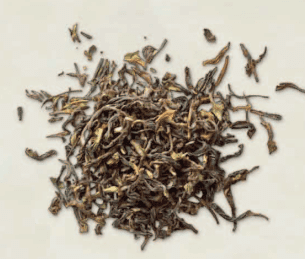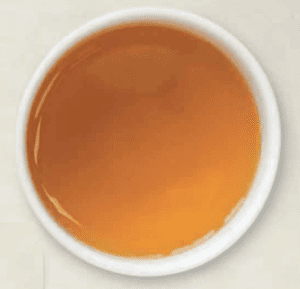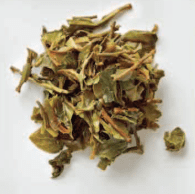Black tea is the most well-known tea in the western world. Familiarity with black tea usually begins with tea-bag tea and famous blends, such as English Breakfast.
This familiarity might lead us to expect the same character from all black teas, but there are many varieties with complex flavors and characteristics.
Black Tea
Black tea is fully oxidized, its polyphenols having converted to Thearubigins (color) and Thea flavonoids (flavor). Heftier varieties, such as Assam, can be complemented with milk and/or sugar, but it is better to taste a delicate tea, such as a first flush Darjeeling, in its natural state, before deciding to add anything.
Historically, most premium black tea is produced in India or Sri Lanka, but owing to its growing popularity among the Chinese, black tea production is set to increase in that region.
Dry Leaves

Some Darjeeling dry leaves have a slight green color, and may be whole or broken.
Black Tea Liquor

This golden liquor of Darjeeling tastes of apple and spice, and has an aroma reminiscent of muscatel grapes.
Black Tea Wet Leaves

While infused Darjeeling leaves appear brown and green, the wet leaves of other black teas may be mahogany, walnut, or even golden in color.
Preparation Guidelines
Tea shown here: First flush Darjeeling, from Darjeeling, India
Measure: 2 tsp for 3⁄4 cup water
Water Temperature: 210°F (100°C)
Infusion: Steep for 2 minutes.
Some whole-leaf black teas, such as Darjeeling or Chinese black teas, may be infused a second time.
For these, add 1–2 minutes to the infusion time.
What is black tea, and how is it different from other types of tea?
Black tea is a Type of Tea that is more oxidized than green, white, and oolong teas. It is made from the leaves of the Camellia sinensis plant, which is the same plant used to produce other types of tea.
The main difference between black tea and other types of tea lies in the processing method. Black tea undergoes a process called oxidation, which involves exposing the tea leaves to air for a period of time. This causes the leaves to turn dark brown or black and creates the characteristic bold flavor and aroma of black tea.
Green tea, on the other hand, is not oxidized, which helps it retain its green color and more delicate flavor profile. White tea is made from young tea leaves and buds that are minimally processed, giving it a subtle flavor and light color. Oolong tea is partially oxidized, resulting in a flavor profile that falls somewhere between green and black tea.
In summary, the main differences between black tea and other types of tea are the level of oxidation and the resulting flavor and aroma profiles. Black tea is known for its robust flavor and dark color, while other types of tea offer more subtle flavors and lighter colors.
Comparison of Black tea and Green Tea
| Aspect | Black Tea | Green Tea |
|---|---|---|
| Processing | Fully oxidized | Minimally oxidized |
| Flavor | Bold, robust, sometimes malty | Delicate, grassy, sometimes vegetal |
| Color | Dark amber to reddish-brown | Pale yellow-green |
| Caffeine | Moderate to high | Low to moderate |
| Antioxidants | Contains catechins and theaflavins | Contains high levels of catechins |
| Health | May aid in digestion, heart health, and focus | May aid in weight loss, heart health, and brain function |
| Steeping Time | 3-5 minutes | 1-3 minutes |
| Best Served | Often with milk and sugar, can be iced | Plain, with honey or lemon, can be iced |
| Popular Types | Assam, Darjeeling, Earl Grey | Sencha, Matcha, Jasmine |
What are the health benefits of black tea?
Black tea offers several potential health benefits, thanks to its high content of antioxidants and other beneficial compounds. Some of the key health benefits of black tea include:
- Heart health: Studies suggest that black tea may help reduce the risk of heart disease by improving cholesterol levels and reducing blood pressure.
- Improved digestion: Black tea contains tannins, which have been shown to help with digestion and may reduce the risk of stomach ulcers.
- Antioxidant properties: Black tea is rich in antioxidants called polyphenols, which can help protect cells from damage caused by free radicals.
- Better focus and alertness: The caffeine in black tea can help improve focus, alertness, and mental clarity.
- Reduced risk of stroke: Some studies have found that regular consumption of black tea may be associated with a lower risk of stroke.
- Improved immune function: Black tea contains compounds that may help boost the immune system and fight off infections.
- Lowered risk of diabetes: Some research suggests that black tea may help improve insulin sensitivity and reduce the risk of developing type 2 diabetes.
- Cancer prevention: While more research is needed, some studies suggest that the antioxidants in black tea may help reduce the risk of certain types of cancer.
It’s important to note that while black tea offers potential health benefits, moderation is key. Drinking excessive amounts of black tea can lead to negative side effects due to its caffeine content.

Comments
Post a Comment